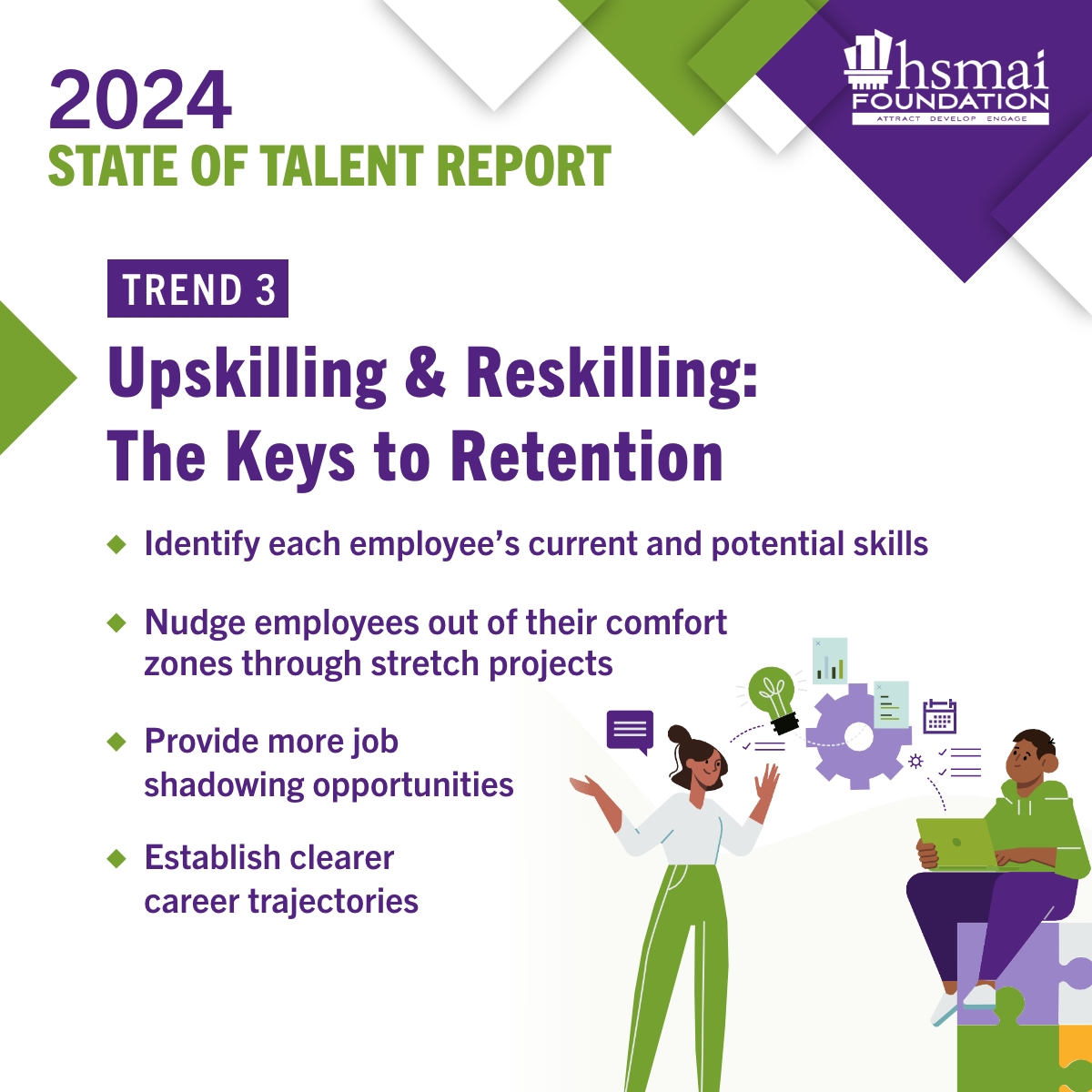Nurturing Tomorrow’s Hospitality Leaders: Retention through Upskilling, Reskilling, and Providing Pathways to Upward Mobility
The HSMAI Foundation Special Report: The State of Hotel Sales, Marketing, and Revenue Optimization Talent 2023-2024, explores the idea: Hands-on learning is the only way to build a pipeline of talent ready for unknown roles. You have to build this talent because you cannot buy them
(McCarthy, 2023). As we navigate the 21st century, the need for upskilling and reskilling is more critical than ever, particularly in the sales, marketing, distribution, revenue management, and loyalty space not only to retain valuable employees but also to position the hospitality industry as a destination career choice.
 In the pursuit of employee retention, it is crucial to emphasize a systematic approach to identifying employees’ skills and fostering their growth within the business. The key is recognizing that every individual is a unique asset, brimming with untapped potential waiting to be discovered and cultivated.
In the pursuit of employee retention, it is crucial to emphasize a systematic approach to identifying employees’ skills and fostering their growth within the business. The key is recognizing that every individual is a unique asset, brimming with untapped potential waiting to be discovered and cultivated.
Gone are the days when traditional learning and development methods sufficed. The rapid pace of technological advancement, coupled with shifting consumer preferences, has ushered in a new era where the old ways of learning and development cannot keep pace with modern-day skill needs. To stay competitive and retain top talent, organizations must adapt, and the answer lies in providing hands-on learning opportunities (McCarthy, 2023).
Today, both employers and employees are forging a new kind of contract—a lifestyle contract that prioritizes mental and physical health. A healthier workplace is not just about offering gym memberships and wellness programs; it’s about nurturing the potential of every employee through continuous learning and growth. This is where upskilling and reskilling come into play, forming the cornerstone of this progressive contract (Ilya Boinic, 2023).
Every revolution in the workplace has created the need for constant learning. The digital age is no exception. As technology transforms every aspect of the hospitality industry, from revenue management to asset management, employees must adapt. However, expecting employees to navigate this journey alone is unrealistic.
Organizations must take the initiative to systematically identify their employees’ skills and actively train and nurture their growth. To achieve this, a multifaceted approach is essential. It begins with identifying employees’ existing skills and potential areas for growth.
To achieve this, a multifaceted approach is essential. It begins with identifying employees’ existing skills and potential areas for growth. By conducting regular skills assessments and performance evaluations, organizations gain valuable insights into the strengths and weaknesses of their workforce. This knowledge forms the basis for tailored development plans.
Stretch project assignments, where employees are pushed out of their comfort zones and encouraged to tackle complex challenges, provide invaluable learning experiences that align with individual growth trajectories. Shadowing individuals in their roles allows for firsthand exposure to the intricacies of the job, accelerating the learning curve. Simulations, such as cyberattack scenarios, offer a safe environment to develop critical skills while fostering confidence and expertise.
By embracing these “lived” learning opportunities, organizations not only foster skill development but also cultivate a culture of adaptability and innovation. Employees become more engaged, motivated, and invested in their careers, making them less likely to seek opportunities elsewhere.
Furthermore, providing clear career trajectories is essential for team members to meet their financial and personal goals. When employees see a well-defined path for growth within an organization, they are more likely to commit themselves to its longterm success. This systematic approach to skill identification and development ensures that employees recognize and seize growth opportunities within the business.
Upskilling and reskilling are the lifelines that will help organizations navigate the turbulent waters of modernization, ensuring that they are well-prepared to meet the demands of an ever-evolving market, while simultaneously fostering a culture of retention and growth.
Key Takeaways
- Hands on learning is needed to fuel talent pipeline.
- Creating internal employment marketplaces powers retention strategies.
- Lifestyle contracts with employees supported by leadership are a new and emerging model.
- Technology advances require constant upskilling.
- Development plans and career mapping are expected.
To read more about the top talent trends, including case studies of this trend, download
the HSMAI Foundation Special Report: The State of Hotel Sales, Marketing, and Revenue Optimization Talent 2023-2024.
About HSMAI
The Hospitality Sales & Marketing Association International (HSMAI) is committed to growing business for hotels and their partners and is the industry's leading advocate for intelligent, sustainable hotel revenue growth. The association provides hotel professionals and their partners with tools, insights, and expertise to fuel sales, inspire marketing, and optimize revenue through programs such as the Commercial Strategy Conference, Sales Leader Forum, and Adrian Awards. Founded in 1927, HSMAI is a membership organization comprising more than 5,000 members worldwide, with 40 chapters in the Americas Region. Connect with HSMAI at hsmai.org.
